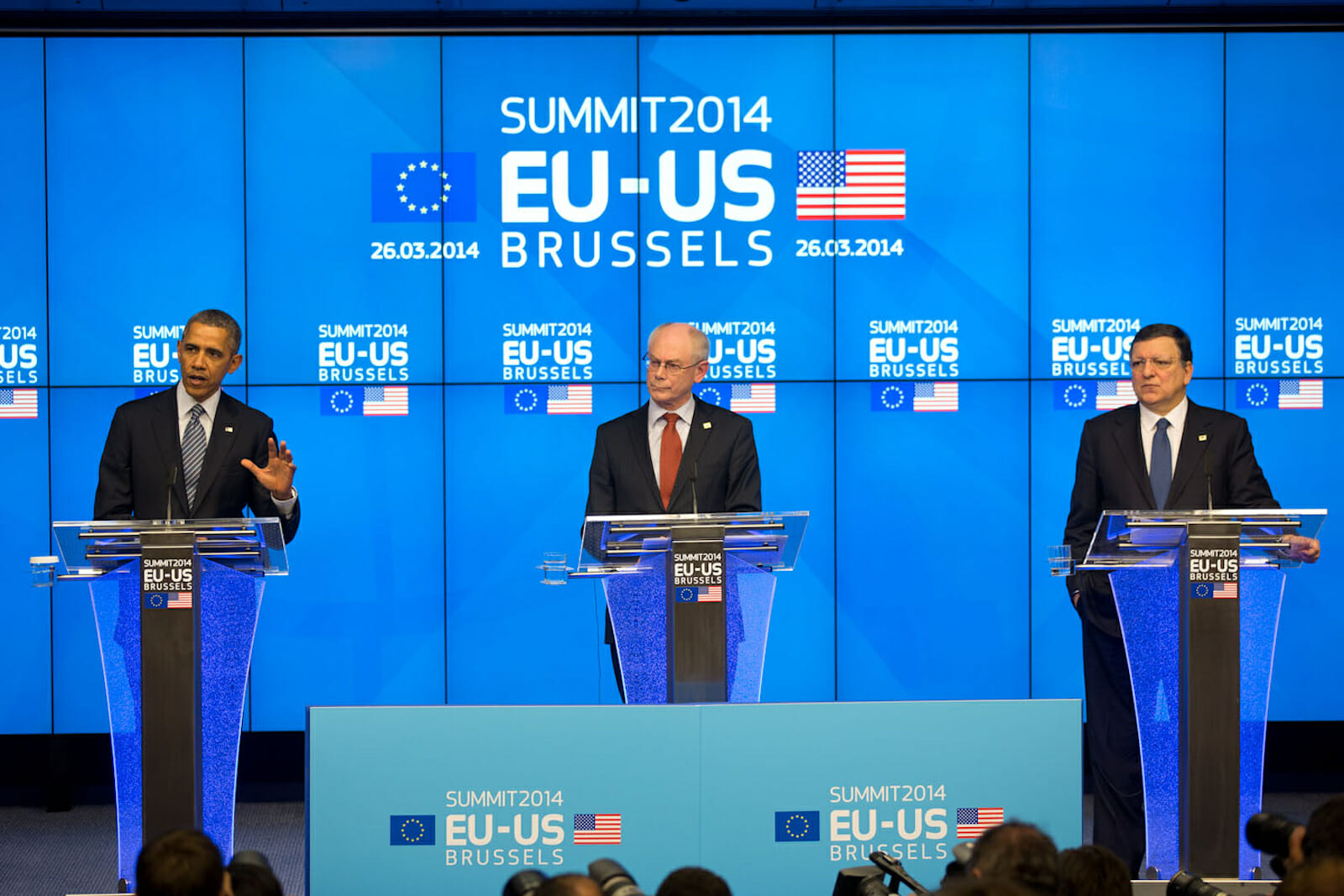
A Pivotal Time for Europe
This past month, I was fortunate enough to have the opportunity to study and visit with officials from both the German government and various branches of the European Union in Brussels. None of this would have been possible without the help of a few people. First, Old Dominion University arranged and offered a great deal of support for the trip. Second, the Konrad Adenauer Foundation provided both a theoretical and physical base for the Berlin leg of the trip. Third, John Callahan of the Ambassador Club made a healthy contribution with a visit and tour of the Battlefield at Waterloo. It was a fantastic ten-day trip that, for me, was another step in a study of the European Union that I began over a year ago.
First, some important background about the European Union. While its current form is relatively new, the body began in 1953 with the European Coal and Steel Community. The overwhelming purpose behind it in the 1950s was to prevent another German rise to power. Over time the Union changed although its roots remained largely economic.
Changing into a common market and later into a customs union, the impetus came from the business sector and the desire for greater trade and commerce. Flash forward to the collapse of the Eastern Bloc and we start to see the Union as it is today. The Union espouses a handful of principles: equal rights, democracy, a priority on the environment and freedom of movement…all of this with the goal of further integration, leading to more decision being made by the European Union and less by the capitals of Europe.
However positive these aspirational watchwords may be, the situation in Europe has not evolved without issue.
First, many are calling on the European Union to take its place among world powers militarily. Second, their currency crisis has created far reaching opposition to the policies of the Union’s leadership in Brussels. Third and finally, migration has become a hot button topic that has been used by Eurosceptic groups to rally strongly nationalist segments of the voting public.
As it stands now, the European Union makes up one of the three largest economies in the world, along with the United States and China. They have strong trade ties to each of these countries, as well as with other large global commercial powers like Russia. Their trade profile is much as it was before and not completely different from that of the United States. They acquire finished goods from China. They work very hard to gain entry into markets controlled by Beijing, sometimes with mixed success. Their energy dependence, again like the U.S., lies elsewhere. In the European case, it is with Russia, not the Middle East. This, as we have seen in recent weeks, can cause problems. Despite their place at the table of the modern great powers, the Union spends a pittance on defense. They largely depend on NATO (read the United States).
There have been inroads made towards what is referred to as consolidated defense and security policy but there are internal barriers. Most countries have overlapping capabilities. Imagine if every state in the Union had enough military equipment to defend its borders from attack. There is also the question of leadership and decision making. Who commands the troops and who makes the decision to go to war? Member states seem to feel better about leaving these decisions to Berlin, London and Paris and not Brussels.
Economically, we see evidence of the centralization of policies. While member states of the Union are still responsible for their own fiscal policy, Brussels is responsible for their monetary policy. I contemplate a United States that could not control its own currency. Imagine if there was no quantitative easing. Interest rates would increase. Money would leave the stock market and head for the bond market. Much of the record earnings today would be gone. Hence, unemployment would increase and the small GDP our country has seen in recent years might be a memory. Across the Atlantic in southern Europe, that is basically what has happened. This along with the conditionality of IMF bailouts has created large discontent with the Union, specifically Germany. Greeks and Italians were in the streets with posters of Angela Merkel with a Hitler mustache. This is where we first see the ugly underbelly of the result of integration that came too fast for many countries to cushion the blow.
Immigration and migration also incite antagonism among Union members. The European Union and its member states have a very complicated ambiguous set of immigration policies. The Schengen Treaty, which allows free travel of persons, was almost unanimously agreed to. This ease of movement is great for leisure travelers or people seeking work in other countries. Yet, there is a rather large wrinkle. While citizens of member states are free to move from country to country, each state’s external immigration policies are different. For example, anyone with a German passport can travel into France, unchecked. (They have a separate line at the airports and lower requirements at the train stations.)
Countries have varying qualifications to be citizens. France, for instance, is very welcoming to persons from their former colonies. Germany has rather strict immigration requirements and a maximum number of new Germans are accepted per year. This creates a paradigm of triangular immigration. People from outside the EU try to find a country that will accept them. From there, they simply move, within the EU to the country of their choice.
Such immigration has become a nationalist flashpoint for many in Europe. These Eurosceptic groups are on the march. Some countries have elected member of these parties into high office. Front Nationale in France, the Alternative for Germany, and Vlaams Belang in Belgium are all Eurosceptic groups that either want EU immigration policies renegotiated or immigration halted. While these groups have the highest-profile, there are a number of others that are far more right-wing, racist and violent: Jobbik in Hungary. Despite the large showing by Eurosceptic parties, the governments will tell you that immigration and migration of some sort are needed.
The truth is that Europe is “graying” as are many other large countries, like Russia. Retired workers are living longer and the birthrate in Europe is at historic lows. Simply put, people are not getting married or having many children. This has caused a shortage of skilled workers and created a prospective economic shortfall in the future. The countries of Europe enjoy large social programs: nationalized healthcare and pensions. Their retired are living longer. This, coupled with a lower number of people entering the workforce, will yield large shortfalls to the pension systems in the coming years. Europe needs to do a number of things to combat this and one of these is legal migration of skilled workers. (They are quick to point out that they cannot compete with the wages and lifestyle of the U.S. or Canada.) From this standpoint, immigration is needed.
Many of the migrants who Europe accepts generally lack language skills, are usually poorly educated and lack the desire to become European in any way. They are drawn to Europe for a variety of reasons: to join family as part of a diaspora, financial gain (something referred to as “welfare tourism”) or to find work. This has created large enclaves of non-Europeans that unfortunately have no desire to become part of anyone else’s national fabric. They remain as societies within societies, sometimes funded by groups from overseas and, at times, they operate in areas dominated by foreign criminal groups.
One borough of Berlin is said to contain a few hundred people who are known criminals. This same area was serviced by a mosque funded by two men in Beirut. This is not to say that migrants from Islamic countries are the crux of the problem. The people I spoke with told me that there are a vast number of migrants from the Arab world that work hard, pay their taxes, know German and are active in the broader community. Yet, these other enclaves and their reluctance to integrate are a large problem.
The prospects for Europe moving forward are mixed. Here are a few points. Europe needs a firm monetary and fiscal footing. While continued integration is the proposed answer, a step back on a few fronts would not be a surprise. Some propose forgiving sovereign debts of southern European countries that was accumulated after their accession to the EU. This all pre-empts the final step: an integrating fiscal policy, which is unpopular with European capitals.
The EU is here to stay. Some countries are considering referendums in order to leave the EU. The Eurosceptic victories of the recent EU Parliamentary election are deceiving. While many alarmists claim that it was stunning, it was more of a mid-term report card on domestic government policies. The price of being isolated from the EU is larger than the price of being a member. While Eurosceptics picked up seats in France and the UK, they lost seats in places like Belgium and Italy. Furthermore, these groups do not agree with one another.
Stress and strain of immigration. There are sets of points of divergence in immigration and fiscal policy. Europe will never give up its large social safety net, but accepting large numbers of low skilled foreign workers will test the system. This is will provide short term pain with longer-term liquidity. The states of Europe seem to be finally adapting to the notion of the greater EU, I foresee a middle ground policy: greater controls on external immigration, with a dash of realism that the governments cannot continue to provide everything for everybody.

